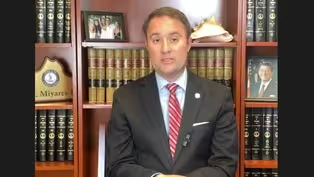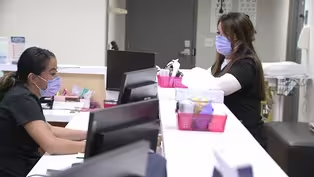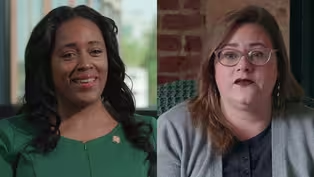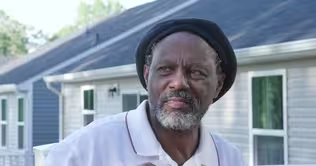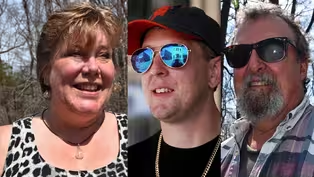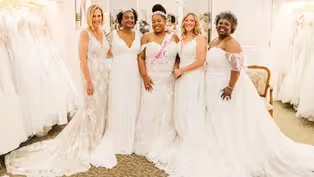VPM News Focal Point
Vietnam POW shares the lessons he learned from captivity
Clip: Season 2 Episode 9 | 9m 45sVideo has Closed Captions
A Vietnam POW survived over 6 years in captivity. He shares the lessons he learned.
A Vietnam POW spent nearly seven years in captivity. He shares stories from his experience as a prisoner of war and what it taught him about himself and others.
Problems playing video? | Closed Captioning Feedback
Problems playing video? | Closed Captioning Feedback
VPM News Focal Point is a local public television program presented by VPM
The Estate of Mrs. Ann Lee Saunders Brown
VPM News Focal Point
Vietnam POW shares the lessons he learned from captivity
Clip: Season 2 Episode 9 | 9m 45sVideo has Closed Captions
A Vietnam POW spent nearly seven years in captivity. He shares stories from his experience as a prisoner of war and what it taught him about himself and others.
Problems playing video? | Closed Captioning Feedback
How to Watch VPM News Focal Point
VPM News Focal Point is available to stream on pbs.org and the free PBS App, available on iPhone, Apple TV, Android TV, Android smartphones, Amazon Fire TV, Amazon Fire Tablet, Roku, Samsung Smart TV, and Vizio.
Providing Support for PBS.org
Learn Moreabout PBS online sponsorshipANGIE MILES: It was 50 years ago in February, 1973, when 600 prisoners of war were released from captivity across Vietnam.
Many of these POWs had been held for years.
Paul Galanti is among them.
He survived 2,432 days in what has become known as the Hanoi Hilton.
He joins us now to talk about his ordeal.
Thank you for being with us.
PAUL GALANTI: You're welcome, Angie.
ANGIE MILES: So I'm sure you shared this story many, many times over the years, but if you would once more for us, what was it like to be an experienced Navy pilot and then to be shot down and captured by the enemy?
PAUL GALANTI: When I was in pilot training, just starting the stage down in Pensacola, there's this young guy, narrow of waist broad, broadest shoulders, big shiny gold wings on his chest.
He stood up there and said, "Everybody looked to your left."
And we all looked to our left.
"Everybody look to your right," and we all looked to our right.
He said, "One of the three of you is not going to be with us in three years."
Hm, that's 30% odds.
That's surviving.
Every single guy in that room was wondering which one of the other two guys it was going to be, and they captured the biggest bunch of optimists in the entire world.
ANGIE MILES: Yeah, well it seems that optimism had quite a bit to do with your surviving that ordeal.
Tell us about the conditions at Hoa Lo, also known as the Hanoi Hilton.
PAUL GALANTI: Well, Hoa Lo was actually pretty good.
It was dry, had a roof over our heads.
The POWs that were kept in the south was much worse because they were out in the jungle and their skin was rotting and falling off.
And by comparison, I mean I had a nice concrete bed to sleep on and in case I was going to roll off it, I had nice little leg irons that would clamp my ankles had to keep me from rolling off.
I got two meals a day, totaling about 900 calories.
A little bowl of either greens, or pumpkin soup, which is pumpkin meat and water, and then usually some rice.
And so, you know, but I made it.
And in fact, I often thought in my entrepreneurial mood, I could come back and start a weight reduction program using that.
And I went from, I wasn't fat, I went from 165 pounds to 120 pounds in three months and I wasn't even trying.
ANGIE MILES: And your sense of humor is clearly intact now.
The conditions that you described certainly don't sound ideal, and we know that more than 100 Americans did die at the Hanoi Hilton.
What are the characteristics?
What are the qualities that kept you going?
that kept you, optimistic as you say?
That kept you alive?
PAUL GALANTI: Well, first, I didn't like 'em.
I got mad at way they were treating us and I wasn't going to give up and die or quit or anything 'cause they made me mad.
And the only way I could keep 'em mad is by doing that.
And it kind of sounds like reverse logic, but I just wanted to make certain that they never thought I was buying their line of nonsense that they were trying to sell to us.
ANGIE MILES: Famously, John McCain was one of the people who was there at the time.
Now, you didn't know him personally during that time, did you?
PAUL GALANTI: No, at the time we had the entire POW population were in small cells, solitary, or one roommate, cellmate, I don't remember ever as a group.
Of course, we couldn't see each other all at the same time for a long time.
But, whenever getting down the whole time in Hanoi.
I knew sooner or later we'd get out and it's just, you know, it goes, you don't realize that you've been there for four years.
Hm, four years.
I think that's a long time.
ANGIE MILES: Well, I wanted to talk about you specifically and your career the Silver Star, Bronze Star, two Legions of Merit, nine Combat Air medals, two Purple Hearts, and more.
You are so decorated, it's uncommon to be so decorated.
What does it say about you, about your resilience, about your character?
What does it say about you?
PAUL GALANTI: There are a whole lot more people with a lot more decorations than I had.
And I mean, it was nice to have 'em.
I've got a little bar I wear sometimes for formal events, but after I retired from the Navy in 1982 nobody knew anything about 'em.
And I really didn't care.
I came home in 1973, the medals were awarded in 1975 and it took a long time to put 'em all together and who gets what and they're really nice.
What I brought back from Vietnam was the memories of about 500 really good guys.
And we went through a dickens together.
We turned from young guys to old guys in that camp and came back with a lot more gray hair, all the scars had healed by the time we got out.
But all those memories, a lot of 'em hilarious and they don't really mean anything except when we get together at a big reunion.
ANGIE MILES: And you came home to Virginia.
Now of course, you grew up in a military family, lived all over the world, but you came here to Virginia with those memories of your support system in Vietnam.
But you had a support system here too in the form of your wife, Phyllis.
You had only been married for a little over a year, less than two years when you were captured, but she was a Tour de Force in trying to get you home.
PAUL GALANTI: Yeah.
ANGIE MILES: Tell us about that.
PAUL GALANTI: Well, when in the hospital we, I was in the first group that got back to the East Coast and all the press wanted to get to us and they were hold it off.
No, no, we don't want to say anything till everybody's back.
Well, after when that was over we were going down by the first ones released, had to go out and offer a press conference.
And when, for mine, they wanted Phyllis there too.
And I said, "Oh, you want Phyllis?"
I said, "No, no, she can't.
She can't do that."
And they would ask me a question and I hesitated for just a second.
Phyllis said, "I'll take that one."
Grabbed the microphone and (mumbling).
Just off running.
And they, someone got a picture of that, my mouth is, my jaw is down about here.
And I said, "Ah, something's gone on here that I don't know about."
And especially when we walked in that room and she knew all the pressies, all these photographers, and all these cameramen and the whole room was just full of 'em and she knew 'em all.
I said, "Hm, this is very interesting."
ANGIE MILES: Well clearly, you have a wealth of information and experience that can be truly helpful to many people.
I want to just summarize or wrap up by asking you about what you learned from the ordeal in Hanoi and your life since then.
What has all of that taught you about survival that you can impart to other people?
PAUL GALANTI: The biggest thing I learned was appreciation.
There are just a ton of things I, as a, you know, typical spoiled American took for granted, but nobody else has those.
And I had more fun in a POW camp than any of those poor North Vietnamese are going to have in their entire lives.
Just reliving the stuff we were doing, building cars in my mind, houses, airplanes, flying airplanes.
We were all, you know, flying, we were all pilots, so each one was better than other guy he is talking to.
But I like it when I'm speaking about this, I've done a lot of speaking around Virginia.
I always summarize with the three things I learned.
And the first one, I wasn't as tough as I thought I was.
And the second was, no matter how bad I had it, somebody else always had it worse.
And I think about them, I say, "Everett Alvarez was the first one captured.
I was there six years and eight months.
He was there almost nine years, in solitary for about the first 18 months."
And that is a really rough thing.
So, I wasn't as tough as I thought I was.
Mr. Tough Guy.
I was like, I could do anything I wanted to do.
Uh, maybe not.
No matter how bad I had it, somebody else always had it worse.
But the thing that stood out most was every day when I get up, I go over, open that bedroom door and walk out and I'm free.
I can go anywhere I want.
My last thing is there's no such thing as a bad day when you have a doorknob on the inside of the door.
ANGIE MILES: That sounds like wisdom and thank you so much for sharing that and all of your comments with us.
We're talking with Paul Galanti, of course.
Former Vietnam POW and definitely a survivor.
Thank you so much.
PAUL GALANTI: Thank you.
Attorney General Jason Miyares is fighting human trafficking
Video has Closed Captions
Clip: S2 Ep9 | 11m 19s | Attorney General Jason Miyares discusses efforts to end the crime of human trafficking (11m 19s)
From unaccompanied minor to physician assistant
Video has Closed Captions
Clip: S2 Ep9 | 2m 59s | This woman uses her Spanish-speaking skills to empower her patients (2m 59s)
Human Trafficking survivors fight back
Video has Closed Captions
Clip: S2 Ep9 | 7m 58s | Two courageous survivors share their stories of being trafficked for sex as teenagers. (7m 58s)
Joseph Carter knows the price of a wrongful conviction
Video has Closed Captions
Clip: S2 Ep9 | 5m 7s | After almost three decades in prison, the Navy veteran is now piecing together his life. (5m 7s)
Psychological aftermath of mass shootings
Video has Closed Captions
Clip: S2 Ep9 | 1m 41s | How do survivors deal with the psychological aftermath of mass shootings? (1m 41s)
Survivors | People of Virginia
Video has Closed Captions
Clip: S2 Ep9 | 57s | How can people be better equipped to handle life’s most challenging situations? (57s)
Women find connection through cancer
Video has Closed Captions
Clip: S2 Ep9 | 3m 15s | Bonded by a cancer, these women found much more than friendship. (3m 15s)
Providing Support for PBS.org
Learn Moreabout PBS online sponsorship
- News and Public Affairs

Top journalists deliver compelling original analysis of the hour's headlines.

- News and Public Affairs

FRONTLINE is investigative journalism that questions, explains and changes our world.












Support for PBS provided by:
VPM News Focal Point is a local public television program presented by VPM
The Estate of Mrs. Ann Lee Saunders Brown
